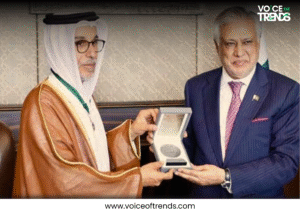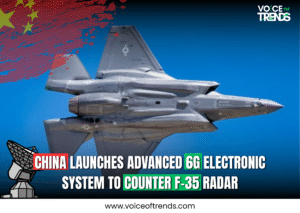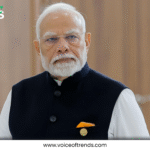In an unexpected and historic gesture, U.S. President Donald Trump welcomed Pakistan’s Chief of Army Staff, Field Marshal Syed Asim Munir, for an exclusive luncheon at the White House in June 2025. The meeting, which marked a pivotal moment in US-Pakistan relations, saw Trump praise Munir as “a man of great character.” The high-level interaction has sparked global interest, especially given the complex geopolitical dynamics in the context of South Asian and Middle Eastern tensions. Below, we examine the significance of the meeting, the reasons behind Trump’s praise, and its broader implications.
Table of Contents
ToggleA Historic Meeting at the White House
The White House luncheon on June 18, 2025, was a rare occasion, as it was the first time a US president had hosted Pakistan’s army chief without senior civilian officials present. The meeting, initially planned for an hour, was extended to two, reflecting the depth of the discussions. Trump’s decision to personally engage with Munir underscores the strategic importance of Pakistan’s military leadership in regional stability and global diplomacy. The US president highlighted Munir’s role in reducing tensions between Pakistan and India following a military standoff in May 2025.
Trump’s public comments after the meeting were impactful. He called the meeting with Munir an “honor”, praising his leadership in preventing a potential nuclear conflict with India. The President also highlighted Munir’s skills in diplomacy, particularly his role in complex regional issues such as the tensions between Iran and Israel. This high praise from a world leader like Trump has increased Munir’s stature, positioning him not only as a military commander but also as a politician with significant influence.
Why Trump Praised Asim Munir
1. Role in India-Pakistan Ceasefire
A key reason for Trump’s praise was Munir’s key role in securing a ceasefire with India. In May 2025, tensions between India and Pakistan escalated after a terrorist attack in Pahalgam, Jammu and Kashmir, that killed 26 tourists. India responded with Operation Sindhura, targeting terrorist infrastructure in Pakistan. Given the nuclear capabilities of both countries, the situation threatened to escalate into a wider conflict. Munir played a pivotal role in easing tensions by working closely with the Indian military, helping to prevent the situation from escalating into a crisis. Trump credited Munir’s efforts, along with those of Indian Prime Minister Narendra Modi, for prioritizing peace over war.
2. Diplomatic Skills and Regional Influence
In addition to his military background, Munir has also demonstrated notable talent in diplomacy. During a White House meeting, where the Iran-Israel conflict was discussed, Trump noted Pakistan’s deep understanding of Iran due to its geographical proximity and historical ties. Munir’s ability to engage in high-level diplomacy while upholding Pakistan’s strategic interests impressed Trump. The US president described Munir as a “great man” with an “impressive personality”, highlighting his combination of seriousness, simplicity, and strategic foresight.
3. Strengthening U.S.-Pakistan Ties
The meeting also signaled a revival in US-Pakistan relations, which have faced challenges in recent years. Trump expressed enthusiasm for a possible trade deal with Pakistan, emphasizing economic cooperation as a path to regional stability. Munir’s invitation to Trump for an official visit to Pakistan further underscored the warm ties. This gesture, along with Trump’s praise, suggests a mutual recognition of shared strategic interests, particularly in counterterrorism and economic cooperation.
Munir’s Leadership: A Blend of Strength and Vision
Field Marshal Asim Munir, who recently assumed Pakistan’s highest military rank, has redefined the role of the country’s army chief. Unlike traditional military leaders, Munir combines battlefield experience with a keen understanding of global diplomacy. His leadership in managing Pakistan’s complex relations with India, Iran and the Gulf states demonstrates forward-thinking. Analysts have noted his ability to balance national security with economic priorities, such as securing the China-Pakistan Economic Corridor (CPEC) and promoting foreign investment in rare earth minerals.
Trump praised Munir as a remarkable and motivating personality, a sentiment echoed by many who view him as a forward-thinking leader. His calm demeanor, patience and ability to navigate sensitive issues have earned him respect both domestically and internationally. The extended White House meeting, which included the presence of key American figures such as Secretary of State Marco Rubio, underscores the confidence in Munir’s leadership.
Broader Implications of the Meeting
The Trump-Munir meeting carries significant implications for regional and global geopolitics:
- U.S.-Pakistan Strategic Partnership: The dinner marks a shift from the strained US-Pakistan relationship under previous administrations. In direct talks with Munir, Trump acknowledged the central role of the Pakistani military in the country’s decision-making, particularly on security and foreign policy matters.
- Iran-Israel Tensions: The Iran debate reflects American concerns about Tehran’s nuclear ambitions and regional influence. Munir’s insight is valuable to the United States, given Pakistan’s close ties to Iran, especially as it steps up its support for Israel. Pakistan’s official stance, advocating de-escalation while condemning Israel’s actions, presents Munir as a potential mediator in the region.
- India’s Response: While Trump praised both Munir and Modi, India strongly rejected claims of US mediation in the ceasefire, insisting it was achieved through direct military talks. The disagreement highlights the delicate balance Trump must maintain in fostering relations with South Asian powers.
- Domestic Reactions in Pakistan: The meeting has drawn mixed reactions in Pakistan. While some see it as a diplomatic victory, others, including supporters of former Prime Minister Imran Khan, protested Munir’s visit, calling for more civilian control and democratic reforms.
The Internet’s Take: Memes and Reactions
The Trump-Munir meeting also captured the internet’s imagination, with social media platforms abuzz with memes and comments. Some humorous posts showed the leaders “brokering peace over biryani,” while others used movie references to highlight the unusual nature of the meeting. These reactions reflect public interest in the high-profile encounter, though they also highlight doubts about the underlying motives, with some speculating about US strategic interests in Pakistan’s military cooperation.
Conclusion: A New Chapter in U.S.-Pakistan Relations
Donald Trump’s praise of Field Marshal Asim Munir as a remarkable leader with a strong personality underscores the growing importance of Pakistan’s military leadership in global affairs. Munir’s ability to navigate complex regional dynamics, from India-Pakistan tensions to Iran-Israel conflicts, has positioned him as a key player on the global stage. The White House meeting not only strengthens Pakistan-US ties but also highlights Munir’s unique blend of military expertise and diplomatic skills. As the two countries explore new avenues for cooperation, the world will see how this partnership shapes the future of regional stability.




















